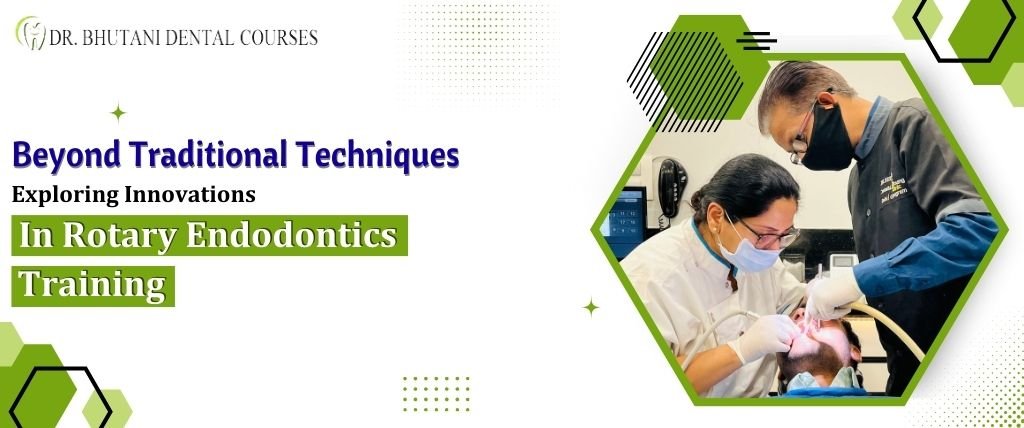Innovations in Rotary Endodontics Training
Introduction:
Rotary endodontics has revolutionized the field of dentistry, offering efficient and precise solutions for root canal therapy. As the demand for advanced endodontic procedures grows, dental professionals seek comprehensive training to master rotary techniques effectively. In this article, we delve into the realm of rotary endodontics courses, highlighting the importance of embracing innovations in training to meet the evolving needs of dental practitioners.
Understanding Rotary Endodontics Courses:
Rotary endodontics courses equip dental professionals with the knowledge and skills to perform root canal procedures using rotary instruments. These courses go beyond traditional techniques, emphasizing the use of mechanized instrumentation to enhance efficiency, accuracy, and patient comfort. Participants gain hands-on experience with rotary files, learn advanced shaping and cleaning techniques, and explore the latest advancements in endodontic technology.
The Evolution of Rotary Endodontics Training:
Advancements in technology have paved the way for significant enhancements in rotary endodontics training. Modern courses integrate digital platforms, virtual simulations, and interactive modules to facilitate immersive learning experiences. Participants benefit from real-time feedback, personalized instruction, and collaborative learning environments, fostering skill development and confidence in rotary techniques.
Key Components of Rotary Endodontics Training:
1.Comprehensive Curriculum: Rotary endodontics courses offer a structured curriculum covering essential topics such as root canal anatomy, instrumentation principles, and treatment protocols. Participants delve into case studies, clinical scenarios, and practical demonstrations to reinforce theoretical concepts and enhance clinical proficiency.
2. Hands-On Workshops: Practical training is a cornerstone of rotary endodontics courses, providing participants with opportunities to refine their skills under the guidance of experienced instructors. Hands-on workshops allow participants to familiarize themselves with rotary instruments, master instrumentation techniques, and troubleshoot common challenges encountered during root canal procedures.
3. Advanced Technologies: Rotary endodontics training incorporates cutting-edge technologies and equipment to simulate real-world clinical scenarios. Participants explore digital imaging systems, rotary instrumentation platforms, and 3D endodontic software, gaining insights into the integration of technology in modern endodontic practice.
Benefits of Pursuing Rotary Endodontics Courses:
- Enhanced Efficiency: Rotary endodontics techniques offer superior efficiency compared to traditional hand instrumentation, enabling dental professionals to complete root canal procedures more quickly and accurately.
- Improved Patient Outcomes: By utilizing rotary instruments, dental practitioners can achieve thorough cleaning and shaping of root canals, leading to improved treatment outcomes, reduced post-operative complications, and enhanced patient satisfaction.
- Professional Development: Rotary endodontics courses provide dental professionals with opportunities for professional growth and advancement. By staying abreast of the latest techniques and technologies, participants can expand their scope of practice, attract new patients, and enhance their reputation as skilled endodontists.
Choosing the Right Rotary Endodontics Course:
When selecting a rotary endodontics course, several factors should be considered:
1. Curriculum Content: Ensure the course curriculum aligns with your learning objectives and professional goals. Look for courses that cover a broad range of topics, including foundational principles, advanced techniques, and emerging trends in rotary endodontics.
2. Instructor Expertise: Opt for courses led by experienced instructors with a track record of excellence in rotary endodontics. Faculty expertise, mentorship opportunities, and instructor-to-participant ratios are crucial factors that contribute to the overall quality of the training experience.
3. Hands-On Training: Prioritize courses that offer ample hands-on training opportunities, allowing participants to practice rotary techniques in a simulated clinical setting. Practical experience is essential for mastering rotary instrumentation and building confidence in performing root canal procedures.
Conclusion:
Rotary endodontics courses represent a paradigm shift in dental education, offering innovative training solutions to meet the evolving needs of dental professionals. By embracing advancements in technology, curriculum design, and instructional methodology, these courses empower participants to excel in rotary endodontics and deliver superior patient care. Whether you’re a seasoned practitioner looking to enhance your skills or a recent graduate seeking to expand your clinical repertoire, investing in rotary endodontics training is a strategic step towards professional growth and success in the dynamic field of endodontics.

